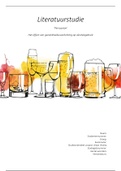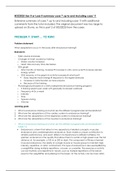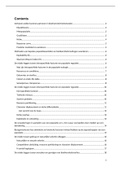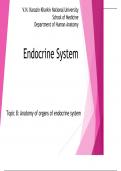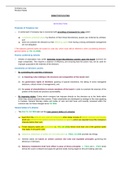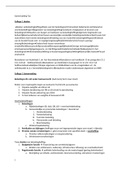Samenvattingen uit het boek
Problem 1
Learning objects
1. What are the rules regarding the offering by states of (State) aid (in EU competition law)?
Chapter VIII: Competition law
State aid
Art. 107(1) TFEU
There are a number of elements
1. Any aid granted by a member state or through state resources in any form whatsoever
2. That distorts or threatens to distort competition
3. By favouring certain undertakings or the production of certain goods
4. In so far as it affects trade between member states
The first element assumes the existence of aid, that is a positive contribution or benefit, but it
can also have a negative dimension. The Court of Justice's approach focuses on the effect on
the aid rather than the form in which it is granted. The following may also be classified as state
aid: (1) tax exemptions or reductions, (2) investments on non-market terms, (3) loans at non-
market interest rates and (4) the sale or letting of land and buildings at non-market prices.
The benefits must be granted by the state in one way or another: directly (the ministry or the
municipality1) or indirectly (a third party). A benefit granted by such a body, which is often a
public undertaking, must be imputable2 to the state (Stardust). Only when the government was
involved in the adoption of the measure concerned can a benefit be imputed to the state and
potentially classified as state aid.
Member states can circumvent the prohibition of state aid by ensuring that benefits are not
funded from taxation (PreussenElektra).
The Commission has recently started taking an active interest in all kinds of tax arrangements
that potentially involve the transfer of state resources. This applies tax-rulings between
undertakings and the tax authorities of a member state. This refers to the prices charged for the
provision of goods and services between the various undertakings within a group. These prices
can be set in such a way that a particular undertaking within the group incurs costs and
generates almost no profit. The first question is thus whether the tax authorities give their
approval, and the second question is the benefit of the undertakings. This is normally done by
the arm's length principle, according to which the price that would be charged to a third party
for the same service or product. The General Court accepted the principle can be used as an
instrument.
,The second and third condition in art. 107(1) TFEU are closely related to one another. A
distortion3 of competition as a result of state aid only arises in situations where certain
undertakings in a member state receive such aid and others do not. If all the participants take
performance in the race, the competition is not distorted, this is known as the selectivity test.
When a measure produces a general benefit, it does not selectively favour certain undertakings
and it does not fall within the scope of art. 107 TFEU and will be qualified as a general scheme
of economic policy. When a general application enables the distribution of certain funds, there
must be a distinction between the general scheme and the individual application of that scheme.
The selectivity test plays a key role in connection within the granting of certain tax exemptions
and the tax liability of undertakings in specific cases (Adria-Wien). Art. 107 TFEU allows
member states to differentiate between undertakings on the basis of objective justifications
when establishing a system of charges that is in the general interest, when the state enjoys a
degree of latitude that enables it to choose the beneficiaries or the conditions under which aid is
provided or exemptions are granted, the selectivity test is deemed to have been met.
Besides specific measures, entire tax systems may also be classified as selective (Gibraltar Tax
Reform-case). The European courts has developed a three-part test to determine whether a tax
measure is selective
1. Identify and examine the common or normal tax system applicable in the member state
concerned.
2. Assess and determine whether the measure concerned derogates from the common
rule for undertakings that are in a comparable situation in the light of the system's
objectives.
3. Examine whether the measure is justified by the nature or overall structure of the system
of which it forms part.
Establishing the selectivity of tax benefits is complicated and is often the subject of
disagreements between the Commission, the General Court and the Court of Justice.
Based on the fourth condition in art. 107(1) TFEU, it appears that the Court is quicker to
assume that trade between member states has been affected in cases concerning state aid than
it is in cases concerning other aspects of competition law.
Art. 107(2) and (3) TFEU
State aid measures that fall within the scope of art. 107(1) TFEU are prohibited, unless they are
compatible with the internal market pursuant to the second or third paragraph of art. 107
TFEU. The difference between these two paragraphs is that the Commission has no
discretionary powers with regard to the application of the former, while in the case of the latter it
does. The policy boils down to a trade-off between the use of state aid to prevent market
failure on the one hand and the distortion of competition on the other. To make this trade-off,
the Commission must first identify the object of general interest, for example environmental
protection. This is followed by a detailed proportionality test where the Commission examines
whether the aid has the effect of changing the behaviour of the recipient undertakings, the
,incentive effect. If the incentive effect does exist, the Commission still needs to examine whether
the aid does not go beyond what is necessary.
State aid procedures
The procedures are described in art. 108 TFEU and Regulation 2015/1589. It is important to
distinguish between existing aid and new aid.
Existing aid is aid that existed prior to the entry into force of the TFEU or aid that has been
authorized by the Commission of the Council. The existing aid is under constant review; if the
Commission concludes that existing aid is no longer compatible with the internal market, it can
propose appropriate measures after obtaining all necessary information from the member state
concerned. If the member state does not accept the measures, the Commission can initiate a
formal investigation procedure that may result in a decision to prohibit the aid.
New aid is aid that is not existing aid, including alterations to existing aid. Any plans to grant
new aid must be notified to the Commission (art. 108(3) TFEU). It may not be put into effect until
it has been authorized or is deemed to have been authorized due to the expiry of the relevant
deadline by the Commission. This standstill clause had a direct effect and also applies to the
financing of the aid, it can also be applied by national courts. The preliminary examination
begins as soon as the plan to grant the aid has been notified to the Commission. The
Commission has 2 months to arrive at one of the conclusions: (1) the notified measure does
not constitute aid, (2) the notified measure constitutes aid and it is compatible with the internal
market or (3) the notified measure constitutes aid but there are doubts as to whether it is
compatible with the internal market, the Commission initiates a formal investigation pursuant to
art. 108(2) TFEU.
The parties have a right to a hearing during the formal investigation procedure, in contrast to
the preliminary examination. At the end of this procedure, the Commission adopts one of the
following four decisions: (1) it can find that the notified measure does not constitute aid, (2) it
can find that the notified aid is compatible with the internal market (positive decision), (3) it can
attach to a positive decision conditions subject to which aid may be considered compatible with
the internal market (conditional decision) or (4) it can find that the notified aid is not compatible
with the internal market (negative decision), with this decision the aid may not be put into effect.
The procedure is outlined in art. 108(2) TFEU.
Unlawful aid is aid that is put into effect without notification. The Commission examines whether
such aid is compatible with the internal market. If it is incompatible with the internal market, the
Commission can require its recovery from the beneficiary.
Case law
PreussenElektra
German legislation provides that electricity produced in Germany from renewable energy
sources must be purchased at minimum prices that are higher than usual. PreussenElektra AG
is a German electricity operator. It supplies electricity to Schleswag AG, a regional electricity
, company. Schleswag is compensated by the state for part of the electricity purchased.
Schleswag will send PreussenElektra an invoice for the other additional costs. PreussenElektra
pays this, but claims it back before the national court on the grounds that the German law is
contrary to European rules on state aid.
Legal question
Does legislation of a Member State which requires private electricity supply undertakings to
purchase electricity produced in their area of supply from renewable energy sources at
minimum prices higher than the real economic value of that type of electricity, and which
allocates the financial burden arising from that obligation amongst those electricity supply
undertakings and upstream private electricity network operators, constitute State aid within the
meaning of article 107 TFEU?
Considerations
Article 107 TFEU provides that State aid, or in whatever form, through State resources, which
distorts competition by favoring certain undertakings or certain products, is incompatible with
the common market in so far as such aid affects trade between affects the Member States. Only
advantages granted directly or indirectly through State resources are to be regarded as aid
within the meaning of article 107 TFEU.
Despite the fact that the financial burden4 resulting from the purchase obligation at minimum
prices may have a negative effect on the undertakings subject to that obligation, the German
legislation cannot be regarded as a means of granting producers of electricity from renewable
energy sources a certain advantage. In the present case, it must be noted that the German
legislation does not entail any direct or indirect transfer of State resources to the producers of
this type of electricity, since the financial burden is shared between the electricity undertakings
and the upstream private network operators. There is therefore no State aid within the meaning
article 107 TFEU.
Rule of law
The fact that the measure is financed 'by a Member State or through State resources' is an
essential element to classify the measure as State aid as it shows the necessity of a link between
the State and its State burden, and the economic advantage gained by a specific undertaking.
Despite the use of word 'or', the CJEU decided in PreussenElektra that 'by a Member State' and
'through State resources' are cumulative conditions. In other words: when the aid does not
involve the direct or indirect transfer of State resources, the aid cannot be seen as State aid in
the sense of article 107 TFEU. So, any aid granted by a Member State or through State
recourses are cumulative conditions.
Relevant paragraphs
Paragraph 56-61.
Stardust
Crédit Lyonnais ran into financial difficulties in 1994 and suffered heavy' capital losses.
Consequently, in the same year the French authorities decided to support the bank financially
by increasing its capital and taking over the risks and costs arising from Crédit Lyonnais's
liabilities.
Problem 1
Learning objects
1. What are the rules regarding the offering by states of (State) aid (in EU competition law)?
Chapter VIII: Competition law
State aid
Art. 107(1) TFEU
There are a number of elements
1. Any aid granted by a member state or through state resources in any form whatsoever
2. That distorts or threatens to distort competition
3. By favouring certain undertakings or the production of certain goods
4. In so far as it affects trade between member states
The first element assumes the existence of aid, that is a positive contribution or benefit, but it
can also have a negative dimension. The Court of Justice's approach focuses on the effect on
the aid rather than the form in which it is granted. The following may also be classified as state
aid: (1) tax exemptions or reductions, (2) investments on non-market terms, (3) loans at non-
market interest rates and (4) the sale or letting of land and buildings at non-market prices.
The benefits must be granted by the state in one way or another: directly (the ministry or the
municipality1) or indirectly (a third party). A benefit granted by such a body, which is often a
public undertaking, must be imputable2 to the state (Stardust). Only when the government was
involved in the adoption of the measure concerned can a benefit be imputed to the state and
potentially classified as state aid.
Member states can circumvent the prohibition of state aid by ensuring that benefits are not
funded from taxation (PreussenElektra).
The Commission has recently started taking an active interest in all kinds of tax arrangements
that potentially involve the transfer of state resources. This applies tax-rulings between
undertakings and the tax authorities of a member state. This refers to the prices charged for the
provision of goods and services between the various undertakings within a group. These prices
can be set in such a way that a particular undertaking within the group incurs costs and
generates almost no profit. The first question is thus whether the tax authorities give their
approval, and the second question is the benefit of the undertakings. This is normally done by
the arm's length principle, according to which the price that would be charged to a third party
for the same service or product. The General Court accepted the principle can be used as an
instrument.
,The second and third condition in art. 107(1) TFEU are closely related to one another. A
distortion3 of competition as a result of state aid only arises in situations where certain
undertakings in a member state receive such aid and others do not. If all the participants take
performance in the race, the competition is not distorted, this is known as the selectivity test.
When a measure produces a general benefit, it does not selectively favour certain undertakings
and it does not fall within the scope of art. 107 TFEU and will be qualified as a general scheme
of economic policy. When a general application enables the distribution of certain funds, there
must be a distinction between the general scheme and the individual application of that scheme.
The selectivity test plays a key role in connection within the granting of certain tax exemptions
and the tax liability of undertakings in specific cases (Adria-Wien). Art. 107 TFEU allows
member states to differentiate between undertakings on the basis of objective justifications
when establishing a system of charges that is in the general interest, when the state enjoys a
degree of latitude that enables it to choose the beneficiaries or the conditions under which aid is
provided or exemptions are granted, the selectivity test is deemed to have been met.
Besides specific measures, entire tax systems may also be classified as selective (Gibraltar Tax
Reform-case). The European courts has developed a three-part test to determine whether a tax
measure is selective
1. Identify and examine the common or normal tax system applicable in the member state
concerned.
2. Assess and determine whether the measure concerned derogates from the common
rule for undertakings that are in a comparable situation in the light of the system's
objectives.
3. Examine whether the measure is justified by the nature or overall structure of the system
of which it forms part.
Establishing the selectivity of tax benefits is complicated and is often the subject of
disagreements between the Commission, the General Court and the Court of Justice.
Based on the fourth condition in art. 107(1) TFEU, it appears that the Court is quicker to
assume that trade between member states has been affected in cases concerning state aid than
it is in cases concerning other aspects of competition law.
Art. 107(2) and (3) TFEU
State aid measures that fall within the scope of art. 107(1) TFEU are prohibited, unless they are
compatible with the internal market pursuant to the second or third paragraph of art. 107
TFEU. The difference between these two paragraphs is that the Commission has no
discretionary powers with regard to the application of the former, while in the case of the latter it
does. The policy boils down to a trade-off between the use of state aid to prevent market
failure on the one hand and the distortion of competition on the other. To make this trade-off,
the Commission must first identify the object of general interest, for example environmental
protection. This is followed by a detailed proportionality test where the Commission examines
whether the aid has the effect of changing the behaviour of the recipient undertakings, the
,incentive effect. If the incentive effect does exist, the Commission still needs to examine whether
the aid does not go beyond what is necessary.
State aid procedures
The procedures are described in art. 108 TFEU and Regulation 2015/1589. It is important to
distinguish between existing aid and new aid.
Existing aid is aid that existed prior to the entry into force of the TFEU or aid that has been
authorized by the Commission of the Council. The existing aid is under constant review; if the
Commission concludes that existing aid is no longer compatible with the internal market, it can
propose appropriate measures after obtaining all necessary information from the member state
concerned. If the member state does not accept the measures, the Commission can initiate a
formal investigation procedure that may result in a decision to prohibit the aid.
New aid is aid that is not existing aid, including alterations to existing aid. Any plans to grant
new aid must be notified to the Commission (art. 108(3) TFEU). It may not be put into effect until
it has been authorized or is deemed to have been authorized due to the expiry of the relevant
deadline by the Commission. This standstill clause had a direct effect and also applies to the
financing of the aid, it can also be applied by national courts. The preliminary examination
begins as soon as the plan to grant the aid has been notified to the Commission. The
Commission has 2 months to arrive at one of the conclusions: (1) the notified measure does
not constitute aid, (2) the notified measure constitutes aid and it is compatible with the internal
market or (3) the notified measure constitutes aid but there are doubts as to whether it is
compatible with the internal market, the Commission initiates a formal investigation pursuant to
art. 108(2) TFEU.
The parties have a right to a hearing during the formal investigation procedure, in contrast to
the preliminary examination. At the end of this procedure, the Commission adopts one of the
following four decisions: (1) it can find that the notified measure does not constitute aid, (2) it
can find that the notified aid is compatible with the internal market (positive decision), (3) it can
attach to a positive decision conditions subject to which aid may be considered compatible with
the internal market (conditional decision) or (4) it can find that the notified aid is not compatible
with the internal market (negative decision), with this decision the aid may not be put into effect.
The procedure is outlined in art. 108(2) TFEU.
Unlawful aid is aid that is put into effect without notification. The Commission examines whether
such aid is compatible with the internal market. If it is incompatible with the internal market, the
Commission can require its recovery from the beneficiary.
Case law
PreussenElektra
German legislation provides that electricity produced in Germany from renewable energy
sources must be purchased at minimum prices that are higher than usual. PreussenElektra AG
is a German electricity operator. It supplies electricity to Schleswag AG, a regional electricity
, company. Schleswag is compensated by the state for part of the electricity purchased.
Schleswag will send PreussenElektra an invoice for the other additional costs. PreussenElektra
pays this, but claims it back before the national court on the grounds that the German law is
contrary to European rules on state aid.
Legal question
Does legislation of a Member State which requires private electricity supply undertakings to
purchase electricity produced in their area of supply from renewable energy sources at
minimum prices higher than the real economic value of that type of electricity, and which
allocates the financial burden arising from that obligation amongst those electricity supply
undertakings and upstream private electricity network operators, constitute State aid within the
meaning of article 107 TFEU?
Considerations
Article 107 TFEU provides that State aid, or in whatever form, through State resources, which
distorts competition by favoring certain undertakings or certain products, is incompatible with
the common market in so far as such aid affects trade between affects the Member States. Only
advantages granted directly or indirectly through State resources are to be regarded as aid
within the meaning of article 107 TFEU.
Despite the fact that the financial burden4 resulting from the purchase obligation at minimum
prices may have a negative effect on the undertakings subject to that obligation, the German
legislation cannot be regarded as a means of granting producers of electricity from renewable
energy sources a certain advantage. In the present case, it must be noted that the German
legislation does not entail any direct or indirect transfer of State resources to the producers of
this type of electricity, since the financial burden is shared between the electricity undertakings
and the upstream private network operators. There is therefore no State aid within the meaning
article 107 TFEU.
Rule of law
The fact that the measure is financed 'by a Member State or through State resources' is an
essential element to classify the measure as State aid as it shows the necessity of a link between
the State and its State burden, and the economic advantage gained by a specific undertaking.
Despite the use of word 'or', the CJEU decided in PreussenElektra that 'by a Member State' and
'through State resources' are cumulative conditions. In other words: when the aid does not
involve the direct or indirect transfer of State resources, the aid cannot be seen as State aid in
the sense of article 107 TFEU. So, any aid granted by a Member State or through State
recourses are cumulative conditions.
Relevant paragraphs
Paragraph 56-61.
Stardust
Crédit Lyonnais ran into financial difficulties in 1994 and suffered heavy' capital losses.
Consequently, in the same year the French authorities decided to support the bank financially
by increasing its capital and taking over the risks and costs arising from Crédit Lyonnais's
liabilities.


